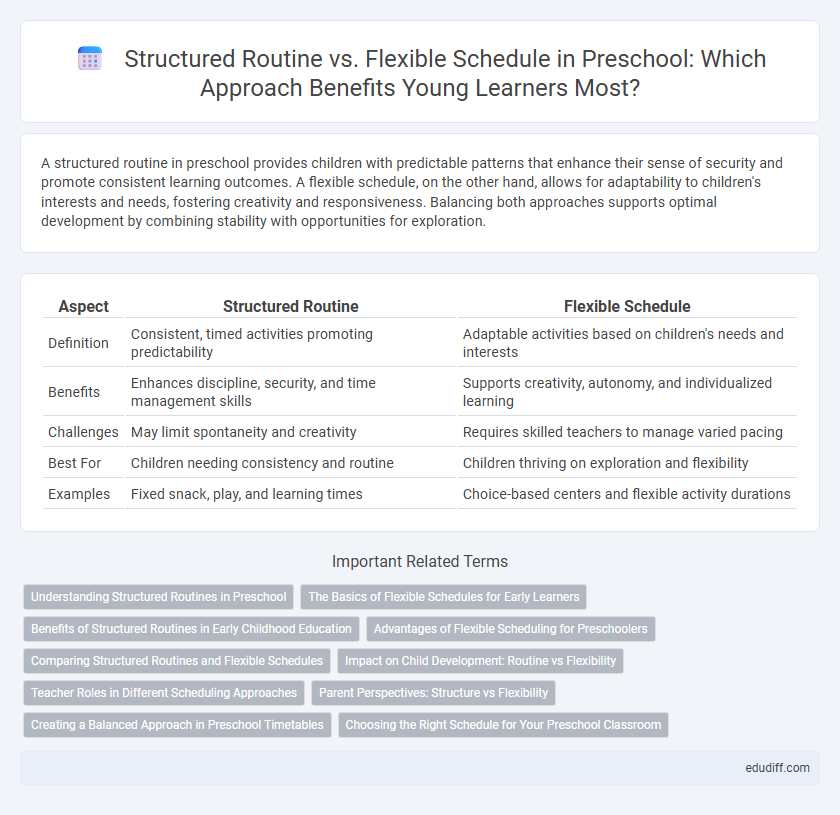A structured routine in preschool provides children with predictable patterns that enhance their sense of security and promote consistent learning outcomes. A flexible schedule, on the other hand, allows for adaptability to children's interests and needs, fostering creativity and responsiveness. Balancing both approaches supports optimal development by combining stability with opportunities for exploration.
Table of Comparison
| Aspect | Structured Routine | Flexible Schedule |
|---|---|---|
| Definition | Consistent, timed activities promoting predictability | Adaptable activities based on children's needs and interests |
| Benefits | Enhances discipline, security, and time management skills | Supports creativity, autonomy, and individualized learning |
| Challenges | May limit spontaneity and creativity | Requires skilled teachers to manage varied pacing |
| Best For | Children needing consistency and routine | Children thriving on exploration and flexibility |
| Examples | Fixed snack, play, and learning times | Choice-based centers and flexible activity durations |
Understanding Structured Routines in Preschool
Structured routines in preschool establish consistent schedules that enhance children's sense of security and predictability, fostering emotional stability and easier transitions between activities. Clear sequences of daily tasks support cognitive development by reinforcing memory, responsibility, and time management skills. Well-defined routines also enable educators to better monitor progress and address individual needs effectively.
The Basics of Flexible Schedules for Early Learners
Flexible schedules in preschool prioritize child-led activities and adaptability, allowing early learners to explore interests at their own pace while fostering creativity and independence. This approach encourages spontaneous learning opportunities and supports individual developmental needs by adjusting the day's flow rather than adhering to strict time slots. Key elements include varied activity options, frequent transitions to maintain engagement, and a balance between guided instruction and free play.
Benefits of Structured Routines in Early Childhood Education
Structured routines in early childhood education enhance children's sense of security and predictability, fostering emotional stability and confidence. Consistent schedules improve time management skills and promote independence by helping children understand expectations and transitions throughout the day. Research shows that structured routines support cognitive development and social-emotional growth by creating an organized learning environment where children can thrive.
Advantages of Flexible Scheduling for Preschoolers
Flexible scheduling in preschool promotes emotional well-being by adapting activities to children's individual needs and energy levels, enhancing engagement and reducing stress. It encourages creativity and problem-solving as children explore interests at their own pace, fostering intrinsic motivation and cognitive development. This approach also supports social skills by allowing more natural interaction times, improving collaboration and communication among peers.
Comparing Structured Routines and Flexible Schedules
Structured routines in preschools provide consistent daily patterns that enhance children's sense of security and promote cognitive development through predictable learning activities. In contrast, flexible schedules allow for spontaneous play and personalized learning experiences, fostering creativity and adaptability in young learners. Balancing these approaches can optimize developmental outcomes by combining stability with opportunities for exploration.
Impact on Child Development: Routine vs Flexibility
Structured routines in preschool foster predictability and security, supporting cognitive development and self-regulation by reinforcing consistent learning patterns. Flexible schedules enhance creativity and social skills by allowing children to explore interests and adapt to changing environments. Balancing routine with flexibility promotes emotional resilience and optimal developmental outcomes in early childhood.
Teacher Roles in Different Scheduling Approaches
Teachers in structured routines guide children through consistent, predictable activities that promote discipline and cognitive development, ensuring clear expectations and smooth transitions. In flexible schedules, educators adapt to children's interests and needs, fostering creativity, social skills, and emotional regulation through spontaneous, child-led experiences. Both approaches require teachers to balance organization with responsiveness, tailoring interactions to optimize learning outcomes and classroom management.
Parent Perspectives: Structure vs Flexibility
Parents often weigh the benefits of a structured routine, which promotes predictability and security for preschoolers, against a flexible schedule that supports creativity and adaptability. Structured routines can help children develop consistent habits and ease transitions throughout the day, while flexible schedules allow for personalized learning experiences and responsiveness to a child's mood and energy. Understanding these perspectives helps educators and caregivers design a balanced preschool environment that aligns with family preferences and developmental needs.
Creating a Balanced Approach in Preschool Timetables
Preschool timetables that balance structured routines with flexible schedules promote consistent learning while accommodating children's varying needs and energy levels. Incorporating set activities like circle time and quiet reading alongside open-ended play periods fosters both discipline and creativity. This balanced approach supports cognitive development, social skills, and emotional well-being in early childhood education settings.
Choosing the Right Schedule for Your Preschool Classroom
Choosing the right schedule for your preschool classroom involves balancing a structured routine with a flexible schedule to support young learners' development. A structured routine provides consistency that fosters security and helps children build essential skills through predictable activities, while a flexible schedule allows adaptation to individual needs and spontaneous learning opportunities. Implementing a hybrid approach maximizes engagement and supports cognitive, social, and emotional growth by combining planned instruction with room for creativity and exploration.
Structured routine vs Flexible schedule Infographic

 edudiff.com
edudiff.com